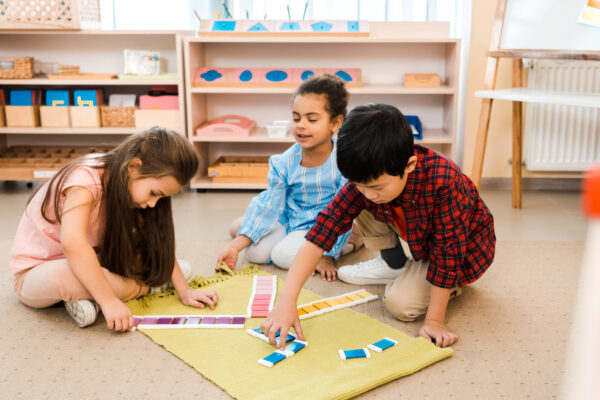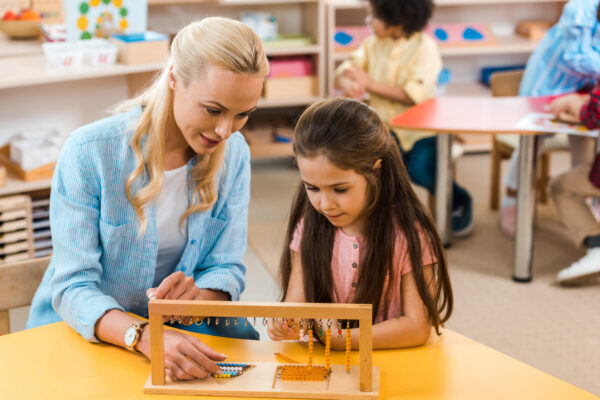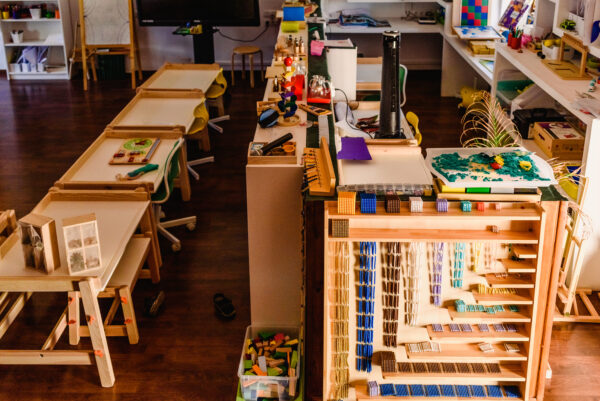In this article, you will learn about the qualities of a good Montessori teacher. You will also learn a bit about what Montessori teachers do in Montessori classrooms and how you can support your child's Montessori guides.
Whether you are giving thought to enrolling your child in a Montessori preschool program, you are wanting to learn a bit about what Montessori teachers do, or you are considering becoming a Montessori guide yourself, you will get some guidance in the article.

How do Montessori classrooms operate?
If you are not familiar with how Montessori works, observing a Montessori classroom can be a big surprise. The children are engrossed in their work, either on their own, in a group of children, or with a guide.
The children are not working under the threat of consequence, nor are they working for the promise of a reward. They are busy and satisfies in their activities, driven by internal motivation.
Montessori relies on the prepared environment; it's an integral part of the Method. Children interact with this prepared environment (and with each other) for a large part of the day.
The Montessori classroom environment and the materials contained therein actually do the bulk of the teaching. Each material and activity has a built-in control of error, allowing children to see their errors and correct them without asking for help.

Qualities of a good Montessori teacher
Asking all the right questions on your Montessori school tour is helpful when choosing the right Montessori program for your child. Observing the teachers during your school tour is important, as well.
For those unfamiliar with how Montessori works, it can be off-putting to parents to watch a Montessori teacher interact with a classroom. Mainstream education has taught us to expect bright and exuberant personalities leading our early childhood education programs.
When a parent or caregiver does not observe this during their school tour, they may get the impression that the teachers are not friendly, or maybe that they are not enjoying their jobs. This is generally not the case, though.
Montessori is not teacher-centered. It's child-led. Properly trained teachers (sometimes called Guides) make the Method work, however.
Qualities beyond a college degree and Montessori certification make a good Montessori teacher, though. In fact, proper education and accreditation are only a small piece of the puzzle.

Here are some qualities of a good Montessori teacher:
- doesn't center the classroom or even a presentation around themselves
- warm and pleasant, but not overpowering, demeanor
- communicates positively with other staff, children, and parents
- uses forms of effective praise
- models the expected classroom behaviors
- culturally sensitive and knowledgeable
- encourages social-emotional development by using positive discipline strategies

- always observant
- professional
- an ally for parents and children
- makes reasonable requests of children
What are the duties of a Montessori teacher?
Now that you know how a Montessori classroom works and what qualities Montessori guides bring to the table to make things run smoothly, let's take a look at some of the duties of a Montessori teacher.
Montessori guides do a lot more than observe children and present materials, though. There is a lot to do throughout the school day for a Montessori teacher and a lot happens behind the scenes.
Qualities beyond a college degree and Montessori certification make a good Montessori teacher, though. In fact, proper education and accreditation are only a small piece to the puzzle.
A Montessori teacher:
- keeps records of presentations, activities, behavior, etc.
- sees that available materials and presentation are based on observations
- sets up strategy meetings with parents
- facilitates cooperative games
- prepares classroom and outdoor environment
- checks that all materials are whole and have all parts
- orders materials and supplies
- fixes materials when possible
- keeps children safe
- redirects during inappropriate behavior
- sits with children during moments of dysregulation
- cleans and disinfects classroom daily
- observes and records sensitive periods and plans presentations accordingly
- plans activities for circle time
- communicates with other staff about their observations

How you can support your child's Montessori guides
Like with most other preschool programs, Montessori school administrators and teachers often have expectations of parents.
Here are some common expectations:
Make sure to review the school's guidelines- Just like with any other early childhood education program, there are guidelines that you should follow. From pick-ups and drop-offs to parent visits, not following these guidelines can be disruptive to the flow of a Montessori class's day.
Ask questions before assuming- Sending your child to a Montessori school is exciting and sometimes a little scary for parents and caregivers. Children can come home with reports of something they did that may surprise you, like using a cutting utensil.
Inversely, your child might tell you that they were not allowed to use an item, like a cutting utensil, by a guide.
Before you jump to the conclusion that the Montessori program is not right for your child, or that the school is not adhering to Montessori principles, it's a great idea to speak with the teacher. Montessori is not haphazard at all, so there is likely a great explanation available to you.
Save the Montessori materials for school– One of the things that make a Montessori preschool classroom tick is the appeal of the materials. If you introduce these materials at home, you run the risk of taking the excitement and appeal of working with the materials away.
Montessori teachers have special training in the order and presentation of Montessori materials. When a child is already familiar, and possibly bored, with the materials, it makes a teacher's job harder.
Ask how you can help- Does the teacher have a special presentation coming up? Maybe they could use an extra hand.
Is there a fundraiser going on? Quality Montessori materials cost money to purchase, replace, and maintain. Collecting a few dollars or putting in a few hours to volunteer is always appreciated.
Some things you can do at home to support your child's Montessori teacher are:
- keep the child's home environment neat and orderly
- model the behavior you would like to see
- set up your home for, and encourage, independence
- avoid rewards and instead use encouragement
- allow for plenty of outdoor play and indoor gross motor activity (helps focus and learning)

Montessori is amazing and Montessori teachers are very special and talented people. When you find a good Montessori teacher for your child, cherish and support them.
Is your child enjoying their Montessori classroom experience thanks to their teachers? If so, let us know some wonderful things the guides do to make your child's day at school so great!
Cheers and don't forget to subscribe!

Montessori parenting believes that the only thing children want is to spend time with their parents. Therefore, parents should make an effort to spend time with their children, whether indoors or outdoors.
Hi there,
I am writing an essay of what makes an ideal montessori teacher and have to reference my work in the harvard style so i would like to ask you for the publishers name and which year this was published as well as place of publication
many thanks
hanaka